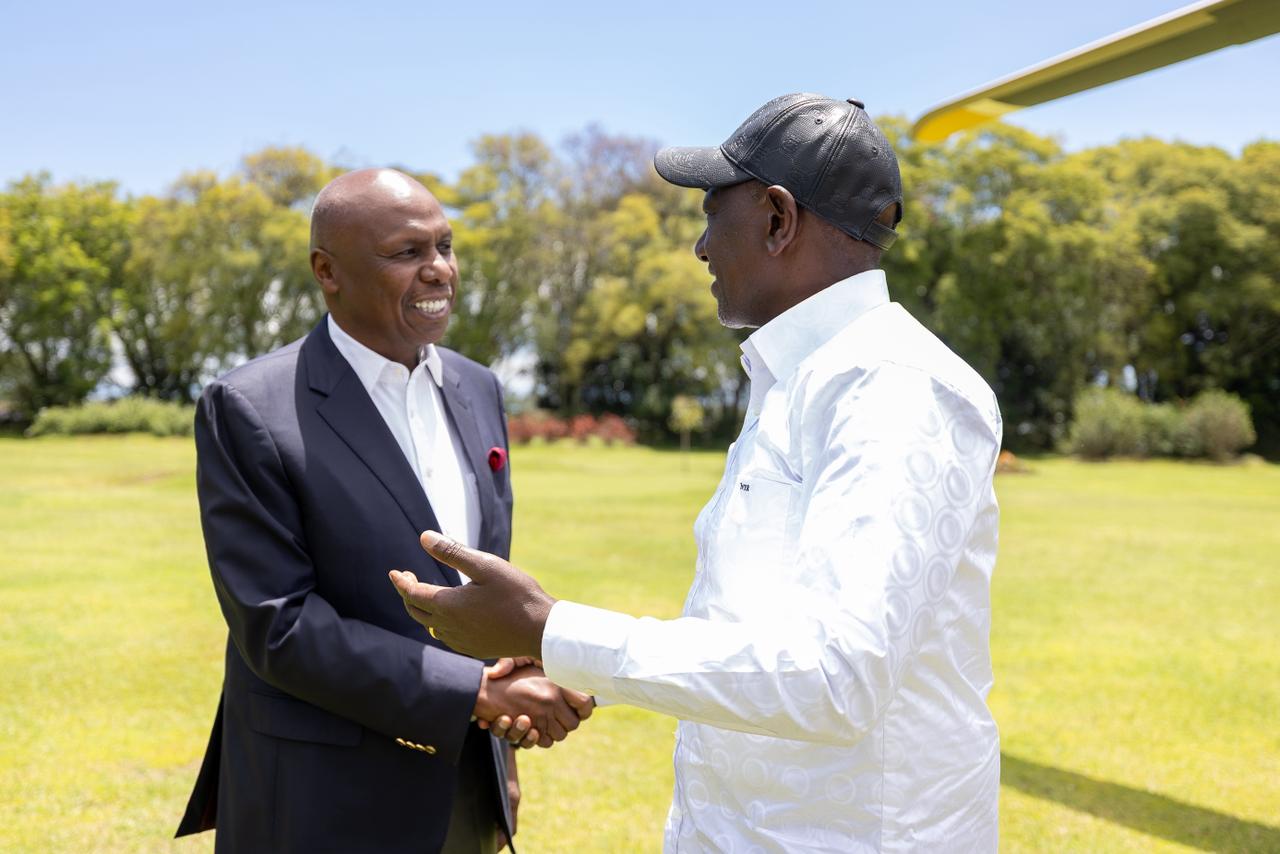![[PHOTOS] Ruto lays wreath at Moi’s mausoleum](/_next/image?url=https%3A%2F%2Fcdn.radioafrica.digital%2Fimage%2F2025%2F10%2F16798851-09d9-4cf8-a193-56e05d6bd767.jpg&w=3840&q=100)
[PHOTOS] Ruto lays wreath at Moi’s mausoleum
He was received by Gideon Moi and other leaders.
The Kanu chairman says the President has promised to complete stalled projects in the region.
In Summary

Audio By Vocalize

Kanu chairman Gideon Moi, on Friday, October 10, opened up for the first time on the behind-the-scenes talks that led to his surprise withdrawal from the Baringo Senate race, a move that paved the way for a political truce with President William Ruto.
Gideon told thousands of supporters that his decision to step down came after Ruto personally assured him that stalled development projects in Baringo would be completed by the national government.
“Today’s
meeting is for the President,” he said as he welcomed the head of state to his
family home at Kabarak home in Nakuru county.
“We are here because you all know what happened on Thursday. I was very ready for the race, and you were ready too, but unfortunately, we never made it," he said.
The former Baringo senator was scheduled to appear at the Independent Electoral and Boundaries Commission offices in Kabarnet to present his nomination papers for clearance. According to the IEBC timetable, he was to appear between 11 am and 2 pm.
After several hours of waiting by his hundreds of supporters, he failed to show up, sparking tension among his supporters who had gathered to receive him.
"I think it is him (Ruto) who knows why,” he added, drawing laughter from the crowd.
The Kanu boss said that before his withdrawal, he held a candid conversation with the President in which he expressed frustration over incomplete projects in his backyard, among them roads and dams, among others.
“I explained to him why I wanted to run,” Gideon said. “I told him I wanted to help my people because I wish and mean well for them," he said.
He said there were many projects he did not finish during his first term.
"When I told him so, he told me, ‘I will take it upon myself to do it.’ Since he is the head of state and he gave me that promise, I accepted to step down."
The former senator added that he invited Ruto to Kabarak so he could address his supporters directly and assure them that the government would deliver on its commitments.
“I told him, now that we have talked, it’s only better you come and talk to my people, and that is what we are doing here today,” Gideon said.
The Friday’s meeting at Kabarak brought together more than 3,000 Kanu members, local leaders and senior figures from the Kenya Kwanza administration, marking a turning point in Rift Valley politics.
The gathering followed weeks of speculation after Moi failed to appear before the IEBC in Kabarnet on Thursday to present his nomination papers, effectively giving UDA’s Kiprono Chemitei an upper hand in the Baringo Senate seat race.
Sources said Gideon’s withdrawal was sealed after a State House meeting on Wednesday night, where Ruto persuaded him to step aside in exchange for a development pact for Baringo and a broader working relationship between Kanu and Kenya Kwanza.
President Ruto, in his address, confirmed that he personally initiated the reconciliation, saying he reached out to the former senator as part of a wider effort to unify the country’s political leadership.
“Kama iko maneno imetokea (if there have been problems), blame it on me,” Ruto said. “Mimi ndiye nilitafutana na (I am the one who looked for) Gideon. I told him the destiny of Kenya is greater than what either of us can get.”
The President said his outreach to Gideon was part of a broader effort to rally all national leaders behind a shared vision of development and unity.
Noting that part of his mission is to unite the country, the President said this was similar to his meetings with ODM leader Raila Odinga and retired President Uhuru Kenyatta in recent weeks.
“I have had a conversation with the honourable Raila Odinga and told him it is important for us, despite everything else, to recognise our potential as a country,” he said. "I have also sat down with my predecessor, Uhuru Kenyatta, and explained to him that we need to move this country to the next level.”
The meeting at Kabarak, attended by more than 3,000 Kanu members and Kenya Kwanza leaders, symbolised a thawing of relations.
It also marked a historic moment, the first time the President had been hosted at the Moi family home in years, signalling what could be a new era of political cooperation ahead of the 2027 election.
![[PHOTOS] Ruto lays wreath at Moi’s mausoleum](/_next/image?url=https%3A%2F%2Fcdn.radioafrica.digital%2Fimage%2F2025%2F10%2F16798851-09d9-4cf8-a193-56e05d6bd767.jpg&w=3840&q=100)
He was received by Gideon Moi and other leaders.